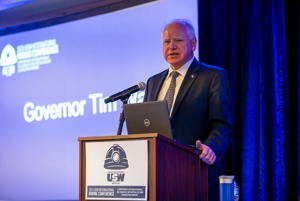NAFTA at 20: One Million U.S. Jobs Lost, Higher Income Inequality
Such outcomes include a staggering $181 billion U.S. trade deficit with NAFTA partners Mexico and Canada and the related loss of 1 million net U.S. jobs under NAFTA, growing income inequality, displacement of more than one million Mexican campesino farmers and a doubling of desperate immigration from Mexico, and more than $360 million paid to corporations after “investor-state” tribunal attacks on, and rollbacks of, domestic public interest policies.
The study makes for a blood-boiling read. For instance, we track the specific promises made by U.S. corporations like GE, Chrysler and Caterpillar to create specific numbers of American jobs if NAFTA was approved, and reveal government data showing that instead, they fired U.S. workers and moved operations to Mexico.
The data also show how post-NAFTA trade and investment trends have contributed to middle-class pay cuts, which in turn contributed to growing income inequality; how since NAFTA, U.S. trade deficit growth with Mexico and Canada has been 45 percent higher than with countries not party to a U.S. Free Trade Agreement, and how U.S. manufacturing exports to Canada and Mexico have grown at less than half the pre-NAFTA rate.
NAFTA’s actual outcomes prove how damaging this type of agreement is for most people, demonstrating why NAFTA should be renegotiated or terminated. The evidence makes clear that we cannot have any more such deals that include job-offshoring incentives, requirements we import food that doesn’t meet our safety standards or new rights for firms to get taxpayer compensation before foreign tribunals for laws they don’t like.
Given NAFTA’s record of damage, it is equal parts disgusting and infuriating that now President Barack Obama has joined the corporate Pinocchios who lied about NAFTA, recycling similar claims to try to sell the Trans-Pacific Partnership (TPP), which is NAFTA on steroids.
As Americans have lived with NAFTA’s effects since its Jan. 1, 1994, start, public opinion has shifted dramatically, from a narrow divide during the 1993 NAFTA debate to overwhelming opposition today. A 2012 Angus Reid Public Opinion poll found that 53 percent of Americans believe the U.S. should “do whatever is necessary” to “renegotiate” or “leave” NAFTA, while only 15 percent believe the U.S. should “continue to be a member of NAFTA.” That opposition cuts across party lines, class divisions and education levels, perhaps explaining the growing controversy over the proposed deepening and expansion of the NAFTA model through the TPP.
This transpartisan public opposition to NAFTA-style pacts is what underlies the growing transpartisan opposition in Congress to President Obama’s request that Congress delegate away its constitutional authorities through Fast Track trade authority. Were it not for Fast Track’s creation of a legislative luge run through Congress for NAFTA, the deal would not have been implemented.
Fast Track was an extreme scheme cooked up by Richard Nixon that was only ever used 16 times, including for NAFTA. It empowered a president to sign a trade agreement before Congress voted on it with a guarantee that the executive branch can write legislation not subject to committee markup that would implement the pact and alter wide swaths of existing U.S. law. Fast Track guaranteed House and Senate votes on this bill within 90 days, with all floor amendments forbidden and a maximum of 20 hours of debate.
In the 19 years since NAFTA and the agreement establishing the World Trade Organization were passed under Fast Track, Congress has woken up to the fact that these pacts rewrite wide swaths of non-trade laws, and Democratic and GOP presidents have had a hard time convincing Congress to put on the Fast Track handcuffs. Fast Track has only been in effect for five years (2002-2007) since then. The same coalition of chronic U.S.-job-offshorers, agribusiness monopolists, Big Pharma, oil and gas giants and the think tanks they fund are gearing up a big push to revive Fast Track because they know that is the only way the TPP could get through Congress.
Among the findings of the NAFTA at 20 study:
- Rather than creating in any year the net 200,000 jobs per year promised by former President Bill Clinton on the basis of Peterson Institute for International Economics projections, job loss from NAFTA began rapidly:
• American manufacturing jobs were lost as U.S. firms used NAFTA’s new foreign investor privileges to relocate production to Mexico to take advantage of that country’s lower wages and weaker environmental standards. U.S. job erosion worsened as a new flood of NAFTA imports swamped gains in exports, creating a massive new trade deficit that equated to an estimated net loss of one million U.S. jobs by 2004. A small pre-NAFTA U.S. trade surplus of2.5 billion with Mexico turned into a huge new deficit, and a pre-NAFTA29.1 billion deficit with Canada exploded. The NAFTA-spurred job loss has not abated during NAFTA’s second decade, as the burgeoning post-NAFTA U.S. trade deficit with Canada and Mexico has not declined.
• More than 845,000 U.S. workers in the manufacturing sector have been certified for Trade Adjustment Assistance (TAA) since NAFTA because they lost their jobs due to imports from Canada and Mexico or the relocation of factories to those countries. The TAA program is quite narrow, covering only a subset of jobs lost at manufacturing facilities, and is difficult to qualify for. Thus, the NAFTA TAA numbers significantly undercount NAFTA job loss.
- NAFTA contributed to downward pressure on U.S. wages and growing income inequality. According to the U.S. Bureau of Labor Statistics, two out of every three displaced manufacturing workers who were rehired in 2012 experienced wage reductions, most of more than 20 percent. As increasing numbers of workers displaced from manufacturing jobs joined the glut of workers competing for non-offshorable, low-skill jobs in sectors such as hospitality and food service, real wages have also fallen in these sectors since NAFTA. The resulting downward pressure on wages has fueled recent growth in income inequality.
- Scores of NAFTA countries’ environmental and health laws have been challenged in foreign tribunals through the controversial “investor-state” dispute resolution system. Foreign corporations have extracted more than360 million in compensation from NAFTA governments via investor-state tribunal challenges against toxics bans, land-use rules, water and forestry policies and more. More than12.4 billion is currently pending in such claims, including challenges of medicine patent policies, a fracking moratorium and a renewable energy program.
- The average annual U.S. agricultural trade deficit with Mexico and Canada under NAFTA stands at $800 million, more than twice the pre-NAFTA level. U.S. beef imports from Mexico and Canada, for example, have risen 130 percent since NAFTA. This stands in stark contrast to the promises made to U.S. farmers and ranchers that NAFTA would allow them to export their way to newfound wealth and farm income stability. Despite an overall 188 percent rise in food imports from Canada and Mexico under NAFTA, the average nominal price of food in the United States has jumped 65 percent since NAFTA went into effect.
- The reductions in consumer goods prices that have materialized have not been sufficient to offset the losses to wages under NAFTA. U.S. workers without college degrees (63 percent of the workforce) likely have lost a net amount equal to 12.2 percent of their wages under NAFTA-style trade even after accounting for gains from cheaper goods. This net loss means a loss of more than3,300 per year for a worker earning the median annual wage of27,500.
- The export of subsidized U.S. corn did increase under NAFTA, destroying the livelihoods of more than one million Mexican campesino farmers and about 1.4 million additional Mexican workers whose livelihoods depended on agriculture.
• The desperate migration of those displaced from Mexico’s rural economy pushed down wages in Mexico’s border maquiladora factory zone and contributed to a doubling of Mexican immigration to the United States following NAFTA’s implementation.
• Though the price paid to Mexican farmers for corn plummeted after NAFTA, the deregulated retail price of tortillas – Mexico’s staple food – shot up 279 percent in the pact’s first 10 years.
- Facing displacement, rising prices and stagnant wages, more than half the Mexican population, and more than 60 percent of the rural population, still falls below the poverty line, despite the promises that NAFTA would bring broad prosperity to Mexicans.
• Real wages in Mexico have fallen significantly below pre-NAFTA levels as price increases for basic consumer goods have exceeded wage increases. A minimum wage earner in Mexico today can buy 38 percent fewer consumer goods than on the day that NAFTA took effect. Despite promises that NAFTA would benefit Mexican consumers by granting access to cheaper imported products, the cost of basic consumer goods in Mexico has risen to seven times the pre-NAFTA level, while the minimum wage stands at only four times the pre-NAFTA level.
Despite the overwhelming evidence of NAFTA’s failure, the Obama administration has made it a priority for this year to sign the TPP, a sweeping pact with 11 Pacific Rim nations premised on expanding the NAFTA model. Past efforts to expand NAFTA throughout Latin America via a Free Trade Area of the Americas and to Asia via an Asia-Pacific Economic Cooperation (APEC) Free Trade Agreement failed as the major economies in each region sought to avoid the damage they observed NAFTA causing within the United States and Mexico.
Given NAFTA’s devastating outcomes, few of the corporations or think tanks that sold it as a boon for all of us in the 1990s like to talk about it, but the reality is that their promises failed as millions of people were severely harmed.
Now the same interests that dished out lies to sell NAFTA are at it again to push the TPP, but the difference is that 20 years of the NAFTA experience has turned Americans against these sorts of deals.
If there is any upside to NAFTA, let it be that its 20 years of damage helps to build the activism outside, and the sense of political liability inside, Congress that are needed to ensure that Fast Track is permanently dust-binned and the NAFTA model is not expanded through TPP.
***
A Harvard-trained lawyer, Lori Wallach has promoted the public interest regarding globalization and international commercial agreements in every forum: Congress and foreign parliaments, the courts, government agencies, and the media. Described as “Ralph Nader with a sense of humor” in a Wall Street Journal profile, “the Trade Debate’s Guerrilla Warrior” in the National Journal, and “Madame Defarge of Seattle” by the Institute for International Economics, Wallach has testified on NAFTA, GATT-WTO, and other trade issues before U.S. congressional committees, numerous other countries’ legislatures, the U.S. International Trade Commission and the Office of the U.S. Trade Representative. Wallach’s work in “translating” arcane trade legalese – indeed, entire proposed international commercial agreements – into relevant, accessible prose has had significant national and international impact.
***
This piece was first published on Public Citizen’s Global Trade Watch blog, Eyes on Trade, and on The Huffington Post.
By clicking Sign Up you're confirming that you agree with our Terms and Conditions.
Related Blogs
Ready to make a difference?
Are you and your coworkers ready to negotiate together for bigger paychecks, stronger benefits and better lives?

